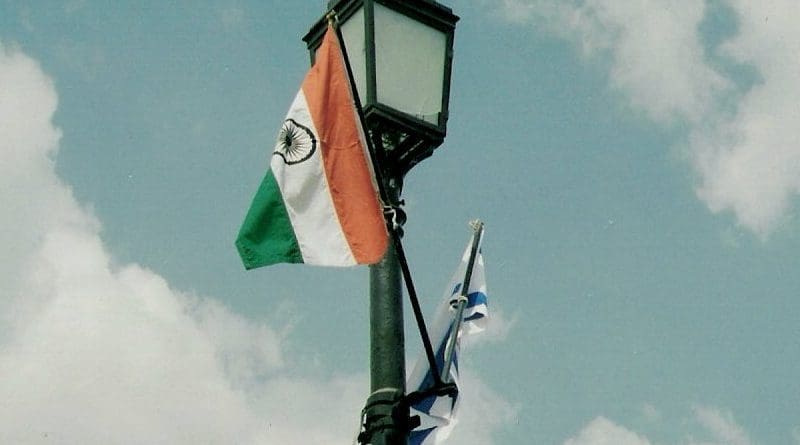India-Israel Strategic Bonhomie – OpEd
By Asad Ali
In September 1950, India’s first PM Nehru extended de jure recognition to State of Israel. A few months later Israel opened a trade office in Bombay which gradually became a consular mission and the first Israeli consul took over in June 1953. However, due to financial constraints and scarcity of personnel, India was reluctant to open a mission in Israel but Nehru expressed his willingness to establish diplomatic ties. But gradually a host of regional and international developments prevented any meaningful interaction and understanding between India and Israel. The 1956 Suez crisis and Nehru’s new friendship with Egyptian President Abdul Nasir introverted progress. Indian leaders had argued that time is not suitable for normalization. Its initial willingness and subsequent reluctance to establish ties remain one of the most controversial aspects of India’s foreign policy.
Following his 1984 electoral victory, former Indian PM Rajiv Gandhi initiated a few contacts. This process became an integral part of pragmatic, non-ideological approach to foreign policy pursued by Rajiv Gandhi’s successor Narasimha Rao. The Cold War’s end, relaxation of global tension, willingness of Arab countries to negotiate peace with Israel, and Madrid peace process enabled Narasimha Rao to pursue a new policy toward Israel.
The recent developments at international level in the aftermath of Russian invasion of Ukraine has once again triggered another debate with regards to strategic cooperation between the countries, blocks and organizations. The world is at defining moment. From economy to strategic point of view, various issues have engulfed the entire arena of global politics. Major international players are revisiting their existing strategic priorities. The recent example of this cooperation is deal between Israel and Indian companies, which is making headlines in international circles.
On January 11, 2023, India’s Adani Group has completed the purchase of Israel’s Haifa port for $1.8 billion. Adani Group secured rights to buy 100% shares of Haifa Port. Located in northern Israel, Haifa is second largest commercial port in Israel that handles nearly half of country’s container cargo and is also a principal port for passenger traffic and cruise ships. The entrance of Indian group has prompted Israel’s leaders to revive hopes of creating a trade gateway connecting Mediterranean port of Haifa and broader Middle East, including KSA, which doesn’t have ties with Israel.
Former Indian Prime Minister Narasimha Rao’s January 1992 decision to establish full diplomatic relations with Israel was partly influenced by potential security cooperation. The threats facing India and Israel are different but rationales behind their arms modernization, buildup, or exports are similar.
Likewise, Indo-Israeli ties have some commonalities as both countries are facing similar issues such as IIOJK and Palestine conflict. Seemingly, India is unlikely to share Israeli concerns over Iran and Islamic radicalism, nor Israel of India’s concerns over China. Due to traditional political ties, geographic proximity, dependence on petroleum supplies and labor migration to Middle East, India is unlikely to abandon its close ties with Arab world. Indian Muslims have been sympathetic toward Islamic countries and their perceived opposition significantly contributed to the prolonged absence of political ties between India and Israel.
In strategic domain, premature disclosures have become a major operational impediment to Israeli arms exports, leading to controversies. Likewise, official or non-official portrayal of Indo-Israeli security cooperation being directed at third countries such as China, Iran, Iraq, Pakistan or Syria would put severe pressures on bilateral ties of New Delhi and Tel Aviv. If the cooperation between the two non-Islamic countries is portrayed as a conspiracy against the Islamic world, even the most pro-Israeli government in India would find it difficult to endure domestic pressures to abandon securities ties with Israel.
The intense and diverse nature of contacts since 1992 indicate that prolonged absence of political ties has not inhibited India and Israel from seeking security cooperation. Largely revolving around the air force, they cover areas such as intelligence cooperation, naval patrol and anti-terrorism. They however share the common objective of seeking technological independence and qualitative superiority. The success of numerous strategic programs currently undertaken by both countries provide the possible framework for strategic partnership.
In future, India and Israel could further develop a strong, mutually beneficial security cooperation in which joint research, development, and production could be more attractive and profitable than arms sales alone. The issue needs critical analysis and SPD, DGMO and other concerned quarters may be asked to critically evaluate the recent strategic developments in India-Israel ties and may devise their plan accordingly. Military modernization of India will create security dilemma in the region and may also trigger arms race as well.
The writer is Islamabad expert of strategic affairs

